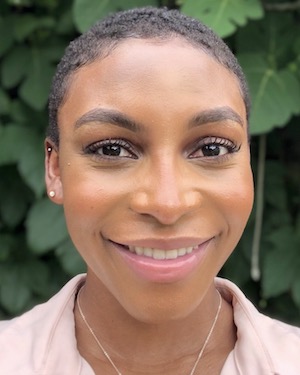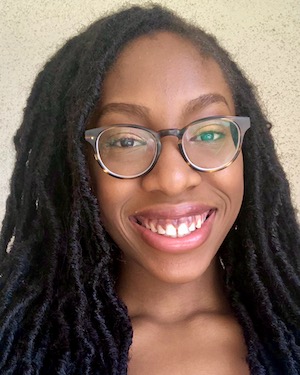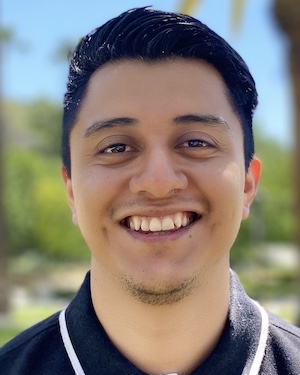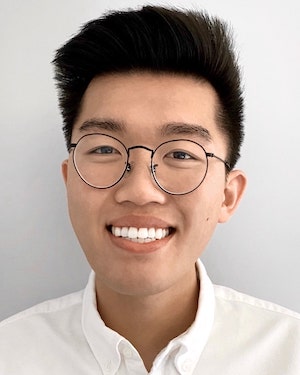Student Blog

Defeating the Feelings of Inadequacy and Non-belonging ⟩
July 2, 2020, by Lamoni
Yesterday, I presented at the student organization fair to give students some information about COTAD. When we, the presenters, were introduced, Dr. Rafeedie referred to us as “second year students.” I am still shocked every time that I hear that phrase. It has already been a full year of graduate school. Am I really half-way done? This question made me think about how I got to this point and all of the feelings of inadequacy that I had to tackle along the way.
The doubts started when I first began my pursuit of higher education. Before my first day of college, I was eager to attend a highly ranked school. I wanted to be challenged. But when I arrived, I was challenged in more ways than one. No one there looked like me. The number of Black students was roughly 5%. And of those Black students, even less were African American. And of those African Americans, few came from low socioeconomic backgrounds. Naturally, I felt out of place due to my race, ethnicity, and income. Along with sharing a class with people from some of the best private high schools in America, I recall questioning my belonging at least several times a week. I do not remember telling anyone about these feelings. My best friend in college was Black but she was not African American and her education was completely paid for by her family. My college was private and very expensive by the way. So, I did not think she would understand. I thought about calling my best friend from high school but she decided not to attend college and was starting a family. She would not understand either. Instead, I pushed those thoughts deep down inside and trucked along. When I graduated, it was the biggest accomplishment of my life. I was so proud! My family was proud! My community was proud!
After college, I knew that I wanted to become an occupational therapist. That, of course, meant going to graduate school. Like I did for college, I traveled across the nation to attend graduate school. I had no family or friends with me. I was starting anew. However, I had already done this once. It would be easier this time. Not so much. Very quickly, the feelings of inadequacy came back. As I walked down the hallways of Chan, I saw portraits of influential women in occupational therapy. Not one portrait was of a Black woman. When we entered the large G37 lecture room, I continued my search for other people that looked like me. I found two. As a class of 144 people, this meant that Black students made up 2%. Truthfully, it was not surprising. Though half of African Americans attend college, according to the National Black Occupational Therapy Caucus, only half of that percentage graduates. According to AOTA’s workforce data from 2014, the percentage of Black occupational therapists is only 4%. With these statistics, it began to feel like this was not the right place for me. But there was a turning point.
During our first summer of the program, we had the honor of receiving a lecture from Dr. Lela Llorens. At our lecture, she spoke about her challenges as a Black occupational therapist and her own feelings of non-belonging. Without knowing, she validated my emotions. Despite her feelings of estrangement, Dr. Llorens greatly influenced our profession’s body of knowledge. In 1969, she received the Eleanor Clarke Slagle Lectureship award — one of the greatest recognitions an occupational therapist can obtain. Additionally, in celebration of occupational therapy’s 100 year history, Dr. Llorens was recognized in AOTA’s list of 100 influential People. Hearing about her achievements dismantled all of my negative thoughts. I have come this far, and I will keep going. Maybe this place was not originally designed for me but there is space for me now. There is space here for others like me, too.
Here are my suggestions for when you feel like you are inadequate or do not belong:
You have jumped over hurdles and navigated barriers time and time again. That is no easy feat! Whether you are just now entering college, finishing college, starting your masters, or completing your OTD, your accomplishments thus far show that you are capable.
When there is already a feeling of non-belonging, it is easy to focus on the negatives. It can send you into a spiral of emphasizing your “failures.” Instead, view everything as a learning tool. If it did not work in the past, what can you do differently? And if it did work, celebrate! Reward yourself! Break the cycle of dismissing validation.
Create a detailed image that affirms your desired outcomes. See the bigger picture. When we have a concrete idea of what we are working toward, we stay motivated. Small rocks in our path may make us stumble but never fall. Do not lose sight of the ultimate goal.
Just like I belong here, so do you.
⋯

My Freshman Year Experience at USC ⟩
July 1, 2020, by Nmachi
As of May 2020, I officially completed my first year at USC! I can truly say that the past year of living on campus has taught me a variety of things- positive and negative. My time as a freshman was so impactful for so many reasons. For one, I was able to meet and interact with people who would soon become like family, I achieved a new level of independence that I never had before, and I started the process of frequent inward thinking and learning more about who I am as an individual and what I desire to become.
I feel like the best place to start when discussing the highlights of my freshman year experience would be the place I called home on campus: Somerville Place. Somerville is a special-interest floor in the dorm building Fluor Tower (main campus); the floor houses freshmen who identify as Black and creates a safe space for them to bond and create lasting relationships. Applying to live on Somerville was, hands-down, the best decision I made during my senior year of high school (aside from applying to USC of course!). Since being involved in the Black community on campus is very important to me, I knew that I needed to put myself in the position to engage with my community everyday. Living with the students I met on Somerville was so fulfilling and freeing because I never had to worry about conforming or changing who I was in any way; I could just be my truest self.
Another highlight from my experience on campus would have to be the overall fun that comes along with attending a school like USC. Going to tailgates and Saturday football games with friends was an experience that I plan to continue to cherish through my career at USC.
On a more academic note, I definitely learned a lot from my experiences with classes. Registering for classes and deciding what you would be interested in was a process that I had to get used to. In terms of attending classes and workload, I think that I was fairly prepared because of how my high school instructed their curriculum. Despite having great preparation, I still found myself struggling with balancing academics and social life, especially because I was literally living with all of my friends on one floor. As time went on throughout both semesters, I began to create my own method of balancing everything in my life in a healthy way.
To all of those who might be seniors in high school and are wondering how life as a college freshman will be, I want to make it clear that every single person will have a different experience. My biggest recommendation is to make the most out of your time as a freshman. Freshman year is the time to discover things that make you happy and that you may want to pursue alongside your career. Make sure to try new things because you’ll probably pick up new hobbies and passions by doing so. Last but not least, take care of yourself by whatever means necessary. As a perfectionist, I tend to stress myself out with getting the best grades and accomplishing the most that I can. It is great to have a drive and to desire success, but it is just as crucial (or even more so) to focus on your physical and mental health.
With that being said, I am beyond grateful to have had the freshman year experience that I did, and am very excited to continue my journey at USC. Fight on! <3
⋯

Meaningful Occupations and Routine Changes During Quarantine ⟩
July 1, 2020, by Daniel
During the COVID-19 pandemic many of us have lost our normal routines and had to either adapt or stop engaging in certain daily occupations. Occupations are activities that we need to do, want to do, or are expected to do in our everyday lives. Everyone has a different definition for what a meaningful occupation is, for example, going to school, working, taking walks, interacting in the community, etc. Social distancing has changed the way we work, socialize, and how we take care of ourselves. Right now, more than ever, occupational therapy plays a crucial role in guiding patients through the process of creating and/or adjusting habits and routines that are personally meaningful and health promoting. Occupational therapy has the ability to address the physical, mental, and spiritual wellbeing of individuals.
During my remote fieldwork at the LAC+USC Adult West clinic, I have had many conversations regarding increased levels of fear, anxiety, anger, and depression. These are completely normal feelings to have during a time of so much uncertainty. People are worried about their health, financial responsibilities, food insecurity, their loved ones, social injustice, etc. Furthermore, the inability to engage in their usual daily occupations has taken a toll on many of the patients at the clinic. Yet, it is important that we do not let these feelings control our lives, and instead, find healthy ways to cope with these feelings and find ways to begin to engage in meaningful occupations. For example, many people are worried about not being able to work which leads to stress and anxiety about how they will provide for their families the longer this continues. To many this is an extreme change in their lives and are not able to engage in what they have considered a meaningful occupation (working) for the last 10-20 years. Often, our phone visits will focus on exploring coping strategies to manage stress or anxiety, and connecting them to resources that may support them with basic necessities. Without the ability to take care of their basic needs, patients have difficulty focusing on managing their health. Furthermore, we support patients by finding ways to increase activity level and engage in safe/appropriate socialization.
Below are some resources that you can use with your future patients and for yourself:
Patient Resources:
- My Therapist Aid: A tool for mental health professionals that includes worksheets, audio, videos, guides, interactive activities, and products. Resources can be searched by topic to tailor activities to client’s needs (i.e. stress, anger, anxiety, depression, grief, self-esteem, relaxation, substance abuse, etc.).
- Mindful USC: free app with guided meditations, as well as information about mindfulness classes, retreats and events in the community.
- UCLA Guided Meditations: different types of free meditations in English and Spanish, that can be played as audio or read using a transcript. The meditations can also be accessed via the “UCLA Mindful” app for free.
- YouTube meditations: YouTube is a great resource for many of our patients because it is free and it has so many options! Patients can explore different types of meditations such as guided meditations, sleep meditations, meditations with music, etc.
- Deep Breathing: a relaxation technique that focuses on taking slow deep breaths to provide relief from stress and anxiety. This reminds you to breathe, bring that heart rate down, and relax your muscles.
- 211LA: A hub for community members and community organizations looking for all types of health, human, and social services in Los Angeles County.
Personal Coping Strategies:
- Music/Lo-Fi Music: Music has always been a coping strategy for stress and anxiety for many years. More recently, I really enjoyed simply playing lo-fi music, which is a type of music that is mostly beats.
- Exercise: Strengthening exercises and running have been one of my biggest coping strategies during moments of stress. Since gyms began to close, I had to re-invent the way that I exercised at home. I started to do more bodyweight exercises and lots of stretching!
- Reading: I know this probably sound exhausting because we usually already have so much to read for school or work! However, I have found it therapeutic to spend at least 20 minutes per day reading books I have genuine interest for and does not feel like more work. A strategy I have been implementing is setting a timer for 20 minutes to read every day.
As I reflect back on the first 7 weeks of fieldwork, I have learned a lot from hearing patients’ personal experiences under these life-changing circumstances. This has been a challenge as I try to support them through a computer monitor and phone. However, this experience has also improved my problem solving, communication, and collaboration skills as the clinic team finds ways to better support patients. This experience has served as a reminder that occupational therapy provides the adequate training to help with challenges that occur when a person is confined to home and is unable to engage in their meaningful occupations.
⋯

A Day in the Life (Zoom Edition) ⟩
June 26, 2020, by Calvin
Calvin is inviting you to a scheduled Zoom meeting.
Join Zoom Meeting
Meeting ID: Calvin’s Corner
Connecting . . .
Hey everyone! Today, I’ll be unmuting and starting my video to show you all a day in my life as a USC Chan Occupational Therapy Student (Zoom Edition)! In this vlog, I invite you into my typical Tuesday where you can see what courses I’ve been taking, what student organizations I’ve been participating in, and so much more. I was actually inspired by our division’s very own Student Vlogger, Caroline Kim, when she posted a day in the life video on the USC Chan YouTube Channel! You can go check out her video here!
I hope that this gives you a good glimpse into my Zoom life and what the program is like right now. Hopefully, I can continue finding the time to make more videos for the “Calvin’s Corner” series, but for now, please enjoy!
⋯

An A+ Doesn’t Define You ⟩
June 25, 2020, by Savi
As a current student earning an Entry-Level Master’s Degree, many people find it easy to assume things about me before getting to know me. These may include that I am very smart, that I love to study, that school is easy for me, and that I am a master of maintaining an appropriate work-life balance. I understand why these are common assumptions since I decided to voluntarily enroll in at least six more years of school after graduating from high school. Although I appreciate that these assumptions are positive, I continuously feel an immense amount of pressure to live up to them every day. Whether that be by taking two extra hours to study instead of sleep, reading over an article more than once to ensure that I have not missed anything for a class discussion, or over-committing myself to various research and other academic pursuits, I make sure that I fulfill the expectations I feel society has placed on me as a graduate student. I spent all of high school and college continuously pushing myself to get the best grades possible and to take on a variety of leadership roles and extracurricular pursuits while acting as though I was never overwhelmed. I convinced myself that being perfect was the only way I could achieve my dream of getting into USC’s occupational therapy master’s program. Now I made it . . . phew! I got into my dream program, and I am pursuing a career that I am extremely passionate about.
You would think that I would allow myself to take a deep breath and relax right? Unfortunately, that was not the case. As I entered into my first summer I hit the ground running. I spent all day and night studying to make sure that I would maintain good grades. I was tired. I had graduated from college a few days before moving to LA to start at USC, and I pretended like I was not exhausted every day. Everyone around me seemed so driven, smart, accomplished, and motivated. I told myself that everyone was an “A+” student and that I had to be one too. As the summer semester ended and the official school year began, I was worried that my energy had depleted so much that I would not be able to make it through the semester. This was the first time I had to ask myself if I had made a mistake choosing to pursue this career. Was I cut out to be an OT? Was I smart enough? Would I fall behind my peers? Could I keep up with the curriculum?
These doubts overwhelmed me until I confided in a professor for advice. In this meeting, I was taught some of the most important lessons that have helped me not only get through but also enjoy my first year of OT school. Here is what I have learned:
- You have been admitted into this program for a reason. You worked hard to get here, and you deserve to be here. A team of skilled OTs decided that you were well equipped to become an amazing OT, so remind yourself that you deserve to be here with everyone else.
- Your skills speak volumes and your grades do not. The wonderful grades you received in your undergraduate career allowed you to be admitted to this program but now you must focus on the learning process, not the end result. You are here to learn and harness the skills to become a great OT.
- You are going to be a graduate of the top occupational therapy educational program in the country, according to the U.S. News & World Report, and you will become a licensed OT after you pass the NBCOT exam. The deciding factor for whether you will get hired over another candidate is your ability to be personable, your experience in the field, and the skills you are equipped with. Focus on what you can learn in the field, from your peers, from your faculty, and from your mentors. These will be your colleagues for life so spend more time learning from them than focusing on getting the perfect letter grade.
- It is OK to not get an A. It is engrained in you that grades are what measure your level of success since it is a big part of what got you to where you are today. You made it here, so now you can breathe and just focus on passing and learning all that you can.
- Have fun because this is the first time you have the chance to immerse yourself in classes focused on your passion! You are surrounded by people that share the same enthusiasm for OT as you so appreciate this unique and special opportunity.
So friends and colleagues . . . it’s OK to not be perfect. Continue to remind yourself that you deserve to be here. Getting a perfect letter grade will not make or break your career so breathe and enjoy the ride. This is a once in a lifetime opportunity. YOU made it.
⋯





